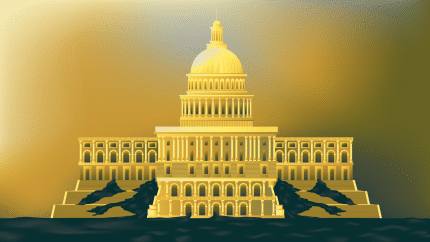
This is the third article of Fossil Money, a series on how the global financial system supports and feeds the climate breakdown. Read the first article here and the second here. Stay tuned for more!
Close your eyes and off you go. You fly back over the pipeline, a powerful wind carrying you along. The green fields lay upstream, and you see some people rest, other people play, other people toil. You see people protesting and fighting against the pipeline, which creeps away in the distance. Little fires start here and there. You realise the dirty fossil money is leaking again. Beyond the horizon, big clouds of smoke rise.
And then, suddenly, you see something unexpected. As people protest, play or work, they put part of their own money in big carts. Some others then come and push the carts uphill, towards the top of the pipeline. And then you see it. Some characters are taking the people’s money and, without their knowledge, are throwing it into the pipeline! How can this happen at all?
Yes, my fellow labyrinth-walkers. Fossil money very often comes directly from people’s pockets! All around the world, but mostly in the Global North, states and other public institutions invest your, my, everybody’s money into fossil fuels. All fossil money is unethical, but directly jeopardizing people’s future with their own resources goes really, unequivocally over the top. That’s why public institutions are particularly vulnerable to people power!
Subsidies and tax cuts
It may sound shocking, given the rhetoric spewed by all parts, but every year, governments pour obscene amounts of money (something between 300 billion and 5.9 trillion US dollars) into fossil fuel subsidies. Public cash is poured into the coal, oil and gas industries, either by giving tax breaks or by paying them directly. Countries use this as a way to artificially lower the prices of these fuels.
Subsidies and tax cuts are extraordinarily flexible and can be applied to any fossil fuel and to any part of the supply chain. Some sources, such as the International Monetary Fund (IMF), even claim that the fact that public institutions pick up the bill for most of the destruction fossil fuel industries cause can be considered another subsidy.
Project undersigning
In order to secure large fossil fuel projects, such as mines, harbour terminals, field developments or pipelines, governments often offer guarantees to companies that eliminate part or all the risk of their investment. That way, public money is committed to covering any unexpected inconveniences, such as extra costs or, sometimes, even the complete collapse of the project.
Public companies
Why give subsidies to companies when you can extract, transport and burn the fossil fuels yourself? This is what many countries do: they own (totally or partially) the companies that are directly responsible for fossil fuels. Consequently, these companies can rely on the government’s support if the financial situation turns rough. Some of the largest oil companies in the world are public, such as Saudi Aramco (Saudi Arabia), Equinor (Norway) and Petrobras (Brazil).
But why? WHY?
If you, my fellow maze-walker, are anything like me, your mind must now be loudly blaring one question: WHY? Why do governments pay for fossil fuels to be burned? Aren’t we supposed to phase them out? Haven’t our leaders committed to doing so?
Well, the answer is that, unfortunately, subsidies are quite sticky. We live in a global economy that is heavily based on dirty fossil fuels, and suddenly changing that machine can upend the livelihoods of many. We’ve seen it in France, Ecuador and many other countries.
However, that should not serve as an excuse for leaders to keep betting on the world’s destruction. After all, there is no economy to take care of on a dead planet.
There are many ways of mitigating the economic consequences of eliminating fossil fuel subsidies, such as providing those directly to poorer families or funding education or employment schemes – that is part of what the climate movement usually refers to as a “just transition”, leaving no one behind. Each country, each region and each community has its own needs, so there’s no one-size-fits-all solution. But there’s something we all know: everywhere, we need to keep fossil fuels in the ground to be able to build a better, cleaner and more equitable future.
The post Fossil Money (III): Public and State Actors appeared first on 350.org.


0 Commentaires